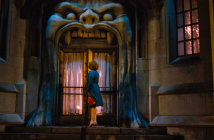 Cast: Peter Haskett, Raymond Huffman (voice)
Cast: Peter Haskett, Raymond Huffman (voice)
Director: Matthew Bate
Country: USA
Genre: Documentary
Official Trailer: Here
PURCHASE NOW!
In 1987, two young men from Wisconsin left home in search of the American Dream. They took the obligatory trek westward to California, hoping to strike it rich in gold mining, show-biz, privacy invasion, or whatever it was that drew people west; as though the only benchmark for individual progress was how far west one went or how far away from home one got. They eventually made it to San Francisco and took up residence in a pre-gentrified apartment building that they lovingly referred to as the “Pepto Bismol Palace” on account of some questionable taste in exterior paint colors. They had made it to their destination, and these two fresh-faced Midwestern boys that came in search of riches and glory found themselves living in an apartment complex of broken dreams and the constant raging of maniacal arguments between two broken people that lived next door. The two boys from Wisconsin had never experienced anything quite like this before, and felt compelled to record these drunken exchanges, first out of a sense of fear, then to satiate their voyeuristic curiosity, and finally because the well of human darkness is as fascinating as it is bottomless.
these two fresh-faced Midwestern boys that came in search of riches and glory found themselves living in an apartment complex of broken dreams and the constant raging of maniacal arguments between two broken people that lived next door.
 After fastidiously recording hours of material, they began to sneak snippets of these fights in to audio mix tapes that they were passing around to their friends. The “Shut Up, Little Man!” tapes became an underground sensation, and they had grown out of the control of audio verite (a term for recording conversations, often unbeknownst to the participants in the search for “truth” or for the purposes of historical documentation) “artists” Eddie Lee Sausage and Mitchell D. They spend a great deal of the film’s runtime trying to justify the reversal of their decision to allow the work to be used freely for artistic purposes, and defend the morality of their actions, but the phenomenon had grown out of their control. It is not difficult to see why they would choose to change their position on letting the material from these tapes be used freely and instead copyright the material after it had already been in the wild and had moved far beyond their control. They realized that they had inadvertently stumbled upon their “pet rock” in the most unlikely of places, and after all, isn’t that what the American Dream is all about? We’re all just waiting in a long line for our turn to sell our soul and reap benefits from the misery of others.
After fastidiously recording hours of material, they began to sneak snippets of these fights in to audio mix tapes that they were passing around to their friends. The “Shut Up, Little Man!” tapes became an underground sensation, and they had grown out of the control of audio verite (a term for recording conversations, often unbeknownst to the participants in the search for “truth” or for the purposes of historical documentation) “artists” Eddie Lee Sausage and Mitchell D. They spend a great deal of the film’s runtime trying to justify the reversal of their decision to allow the work to be used freely for artistic purposes, and defend the morality of their actions, but the phenomenon had grown out of their control. It is not difficult to see why they would choose to change their position on letting the material from these tapes be used freely and instead copyright the material after it had already been in the wild and had moved far beyond their control. They realized that they had inadvertently stumbled upon their “pet rock” in the most unlikely of places, and after all, isn’t that what the American Dream is all about? We’re all just waiting in a long line for our turn to sell our soul and reap benefits from the misery of others.
The morality of these recordings and the subsequent dealings with those actions drives the undercurrent of this film. Were Eddie and Mitchell morally reprehensible for exploiting these colorful characters, or was the result of their actions sufficient to justify the means? It is not for me to decide the morality of the action as what has been done cannot be undone, and the mythos of Peter J. Haskett and Raymond Huffman has grown and permutated across many different artistic media over the years. There is an anthropological importance to these audio verite recordings despite any shaky moral footing, and the truths they offer are blunt and unvarnished. There is a starvation for all things genuine in modern society, and these raw tapes represent a truth that is shielded from public view. Some respond to these tapes with laughter as a defense mechanism against the pain of the truth that is being represented, knowing that we ourselves could be a few bad decisions away from their fate. Others listen to the tapes out of a sense of anthropological curiosity as these tapes document an often underseen or ignored element of society, and these audio treasures uncover truths that are not found in the artificial constructs of the realities that we live in.
Documentaries are often plagued by an obligation to create an easily digestible narrative, with protagonists, villains, and clearly defined black and white morality. The documentary film presents itself as some beacon of truth amidst a medium of fiction and explosions, but ironically misrepresents the truth in service of making the film more palatable to a mass audience. It lies through omission, agenda, and skews truths to form a cohesive narrative, but anyone looking for objective truths in a film is going to walk away with little more than confirmation of their own biases. Shut Up Little Man! acknowledges the falsehoods within itself, and makes direct references to those falsehoods by highlighting the fact that information had to be withheld or censored to protect certain identities. It does this by covering the mouths of speakers with comically oversized censorship bars and overdubbing their words with sound bites from the tapes of Peter and Ray. The film wants you to notice this, and wants you to understand the irony of concealing truth in a format that by definition is supposed to capture truths. The truth must be commoditized, carefully controlled, copyrighted, and stripped of anything that could be construed as profound or “real”.
The documentary film presents itself as some beacon of truth amidst a medium of fiction and explosions, but ironically misrepresents the truth in service of making the film more palatable to a mass audience.
 Shut Up Little Man! was above all an engaging documentary that sheds a little bit of light on the nanoculture of audio verite, makes us ask questions about what defines art, confronts the inherent voyeurism that lives in us all, the nature of comedy and what constitutes “funny”, and the subjectivity and constant manipulation of truth. It also constructs a narrative about the empty promises of the American Dream as two fresh faced Midwestern boys go west in search of the American Dream, only to find the nightmarish depths of human depravity and the tragedy inherent to the human condition. This depravity infects them, and it becomes what defines their actions for a great many years. They are still defined by it over two decades later, and the tapes remain as fresh and fascinating as they day they were recorded. Eddie and Mitchell conduct themselves in a way that may seem reprehensible and exploitative, but one must remember to keep perspective on these things. It is impossible to know the motivations behind a person’s actions, and you certainly wouldn’t want anyone to judge the entirety of your moral character using only a 90 minute documentary about one facet of your life. Morality is a complex thing, and artistic expression must live in a place beyond those concepts. It is easy to sit in judgment of Eddie and Mitchell for exploiting Ray and Peter, but it isn’t quite as easy to look beyond the outward facing morality questions to find the more profound questions and truths that lie just below the surface.
Shut Up Little Man! was above all an engaging documentary that sheds a little bit of light on the nanoculture of audio verite, makes us ask questions about what defines art, confronts the inherent voyeurism that lives in us all, the nature of comedy and what constitutes “funny”, and the subjectivity and constant manipulation of truth. It also constructs a narrative about the empty promises of the American Dream as two fresh faced Midwestern boys go west in search of the American Dream, only to find the nightmarish depths of human depravity and the tragedy inherent to the human condition. This depravity infects them, and it becomes what defines their actions for a great many years. They are still defined by it over two decades later, and the tapes remain as fresh and fascinating as they day they were recorded. Eddie and Mitchell conduct themselves in a way that may seem reprehensible and exploitative, but one must remember to keep perspective on these things. It is impossible to know the motivations behind a person’s actions, and you certainly wouldn’t want anyone to judge the entirety of your moral character using only a 90 minute documentary about one facet of your life. Morality is a complex thing, and artistic expression must live in a place beyond those concepts. It is easy to sit in judgment of Eddie and Mitchell for exploiting Ray and Peter, but it isn’t quite as easy to look beyond the outward facing morality questions to find the more profound questions and truths that lie just below the surface.
What Eddie and Mitchell have captured does contain merit as an anthropological curiosity, a look in to the darkness of the human condition, and as a source for humor for many. There is no correct interpretation and the historical merits are yet to be determined. These tapes may be in circulation for decades, perhaps even centuries, and long after the intentions, motivations, and potential moral or legal missteps of Eddie and Mitchell have been long forgotten, these tapes will exist as the sole documentation of two very flawed people that somehow cohabitated in the dire straits of a hellish existence fueled by alcohol, and for that they will always have value.
DVD Extras:
The DVD extras are a tad on the anemic side, not offering too much insight in to the film that one couldn’t have ascertained from watching it.
The first extra is a short that follows Eddie and Mitchell as they return to the “Pepto Bismol Palace” to find it remodeled and stripped of the character and demented charm that it once possessed. The short was mostly uninteresting, and seemed like an attempt by Eddie and Mitchell to justify their actions after they had been slightly villainized in the documentary, but I wasn’t really buying what they were selling and when they spoke about microphone placement it seemed more like self defense than an attempt to show things the way they happened. There is nothing intrinsically interesting about the space without colorful characters adding their manic energy to the surroundings, and the mythos had long been gentrified and whitewashed to maximize income potential by bringing in renters with more money.
The extended interview with Ivan Brunetti was slightly more interesting, as at least he has sense enough to question the morality of these actions and ponder the bigger picture, and we are able to see glimpses genuine remorse in his eyes for his complacency in the exploitation of Ray and Peter.
The short film recreations were uninteresting insofar that the real power in the material was the audio itself, and the reality didn’t really need to be artificially recreated to give the words context.
The DVD would have benefited greatly from the inclusion of the audio recordings so the content could be taken on its own terms, but I’m sure they would happily point us to the CDs that are also available. It’s OK, though, Peter was paid $100 and he’s long dead, so we are free to capitalize on the folly of his pain for as long as we like.
[notification type=”star”]77/100 ~ GOOD Shut Up Little Man! was above all an engaging documentary that sheds a little bit of light on the nanoculture of audio verite, makes us ask questions about what defines art, confronts the inherent voyeurism that lives in us all, the nature of comedy and what constitutes “funny”, and the subjectivity and constant manipulation of truth. It also constructs a narrative about the empty promises of the American Dream as two fresh faced Midwestern boys go west in search of the American Dream, only to find the nightmarish depths of human depravity and the tragedy inherent to the human condition.[/notification]



